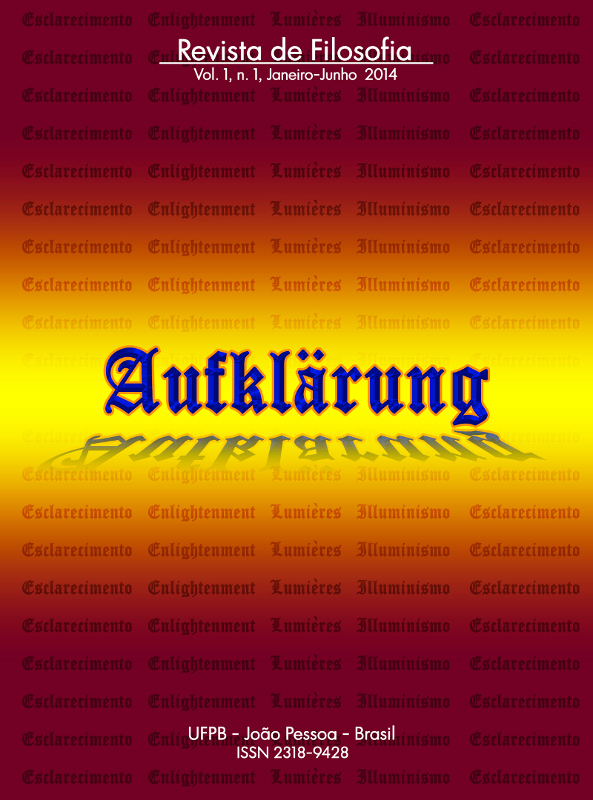Inifinity And Otherness: The Ethical Subjetivity Inspired By The Heteronomy In Emmanuel Lévinas
DOI:
https://doi.org/10.18012/arf.2016.18503Keywords:
Self and Other, Totality and Infinite, Ethical Subjectivity, HeteronomyAbstract
The aim of this article is to present the Levinasean thought before as the more original interpretation as possible, seeking to preserve the relevance of the thought of this philosopher to the posterity, particularly, that regarding his phenomenological reduction method. By using this method, Levinas proposes the escape from the analytical understanding model about reality, which had dominated throughout modernity, as a system will which revolves and gives back everything to the totality of the Being, horizon by excellence, founded on an onthology, in a way to always operate a remission to the Being as well as the individualities endowed with alterity by nature. Instead of building a new encapsulating ethical system of the subjectivity in the Reason of Being, Levinas aims to unveil, by means of a phenomenological description, a call by the Infinite through the other, which gets installed since an immemorial past in subjectivity, not allowing it to surrender to the lethargy of the modern rational subjectivity, already so much targeted by the systems of totality, leaving it at the mercy of the excess of Being potentialized by modernity and almost completely destroyed by the world revolutions, also understanding them in the form of wars impelled by the civilization of the Aufklärung, i.e., Europe. The relocation of ethics as first philosophy is one more need in our days, once we have witnessed the pari passu technological development, modes of domination over subjectivities, subsumed to the biopower and to the biopolicy of a philosophical essence, at least, not caring with the most originary basis of the human phenomenon in this planet in its own alterity.Downloads
References
KANT, Immanuel. Fundamentação da Metafísica dos Costumes. São Paulo: Companhia Editora Nacional, 1964.
LEVINAS, Emmanuel. Totalité et infini - essai sur l'exteriorité. La Haye: Martinus Nihjof, 1965.
MELO, Nélio Vieira. A ética da alteridade em Emmanuel Levinas. Porto Alegre, Edpucrs, 2003.
PELIZZOLI, Marcelo Luiz. Levinas: a reconstrução da subjetividade. Porto Alegre, Edipucrs, 2002.
PIVATTO, Pergentino Stefano. Ética da Alteridade. In: Correntes fundamentais da ética contemporânea. Petrópolis, Vozes, 2000.
PLATÃO. A República. Coleção obra prima de cada Autor - texto integral Martin Claret, 2004.
SUCASAS, Juan Alberto. Emmanuel Levinas (1906-1995) – El absoluto ético. In: Un libro de huellas: aproximaciones al pensamiento de Emmanuel Levinas. Orgs. Ramos, M.B. e Chico, D. P. Madrid, Trota, 2004.
RUIZ, Pedro Enrique Garcia. Transcendencia y subjetividad según Emmanuel Levinas. In: Um libro de huellas: aproximaciones al pensamiento de Emmanuel Levinas. Orgs. Ramos, M.B. e Chico, D. P. Madrid, Trota, 2004.
ZIZEK, Slavoj, Menos que Nada - Hegel e a sombra do materialismo dialético. São Paulo: Boitempo, 2013.
Additional Files
Published
How to Cite
Issue
Section
License
Journal general policy
1.This journal works under a Creative Commons License aplied to online journals. That icence can be read in the following link: Creative Commons Attribution 4.0 International (CC BY 4.0).
2.Accordingly to this License, a)the journal declares that authors hold the copyright of their articles without restrictions, and they can archieve them as post-print elsewhere. b)the journal allow the author(s) to retain publishing rights without restrictions.
Metadata Policy for information describing items in the repository
1. Anyone may access the metadata free of charge at anytime.
2.The metadata may be re-used in any medium without prior permission, even commercial purposes provided the OAI Identifier or a link to the original metadata record are given, under the terms of a CC BY license refered for the Journal.







































